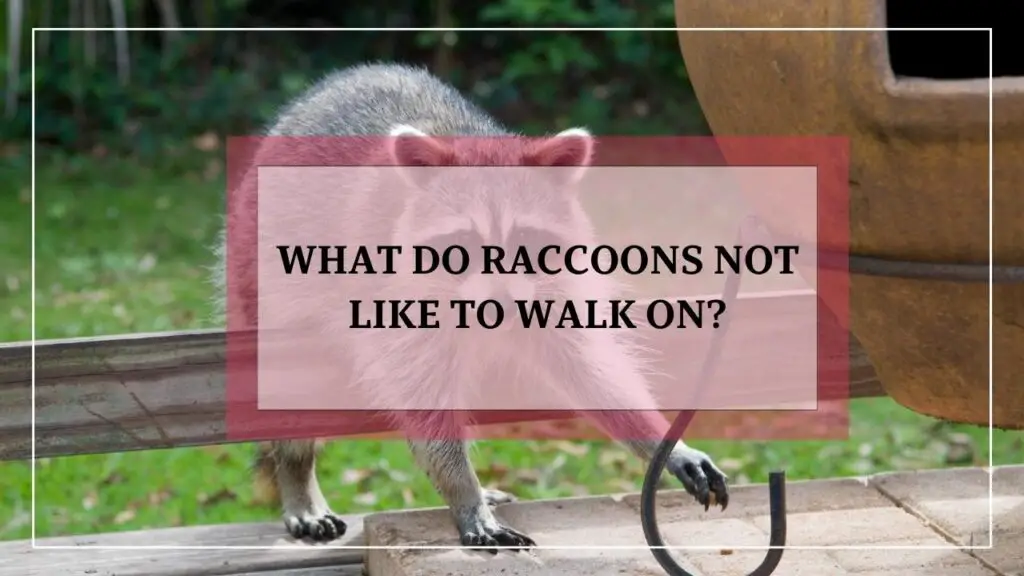Raccoons are fascinating creatures that live in many parts of the world, including North America. They are known for their cleverness and mischievous behavior, often getting into garbage cans or causing trouble in people’s yards. But have you ever wondered if there is something that raccoons really don’t like? Well, the answer is yes!
Raccoons are not big fans of walking on things that feel sticky or prickly to their paws. You see, raccoons have very sensitive feet, kind of like how you might feel ticklish or uncomfortable when walking on something sticky or prickly. So, things like sticky adhesives, thorny plants, or even surfaces with sharp edges can be quite unpleasant for raccoons to walk on.
These clever animals prefer walking on smooth and solid surfaces, like the ground or tree branches. They are excellent climbers and can easily maneuver their way around trees and other structures. So, if you want to keep raccoons away from certain areas, making them sticky or prickly might just do the trick!
Now that we know what raccoons don’t like to walk on, let’s explore some ways to use this knowledge to help keep them out of our spaces.
Natural Habitats of Raccoons
Raccoons are quite the adventurous creatures and can be found in a variety of habitats. They are extremely adaptable and can make themselves at home in forests, marshes, prairies, and even urban areas. These mischievous critters have a knack for finding food and shelter wherever they go.
Related Article:What Flowers Do Raccoons Not Like?
Adaptability to Various Environments
One of the reasons raccoons are so successful in different habitats is their ability to adapt. They have a wide range of dietary preferences, feeding on everything from fruits and nuts to small animals and insects. This adaptability allows them to thrive in different ecosystems, whether it’s a lush forest or a bustling city.
Their Sneaky Nature
Raccoons are known for their curious and intelligent nature, which helps them navigate and survive in various environments. They have a remarkable ability to problem-solve and are always on the lookout for new opportunities. So, don’t be surprised if you find these clever creatures exploring your backyard or rummaging through your trash cans!
Now that we’ve covered where you might find raccoons, let’s take a closer look at their feet and paw pads.
Raccoon Behavior and Preferences
Raccoon Behavior: Curious and Intelligent Creatures
Raccoons are fascinating creatures known for their curious and intelligent behavior. They are constantly exploring their surroundings, looking for food and interesting objects to investigate. Their inquisitive nature often leads them to unusual places and situations. It’s no wonder they have a reputation for being mischievous!
Raccoon Preferences: Surfaces They Love and Avoid
When it comes to walking, raccoons have their preferences. Just like humans, they have surfaces they enjoy and ones they’d rather avoid. Understanding these preferences can help us create outdoor spaces that are raccoon-friendly.
Related Article:What Do Raccoons Like
Avoiding Sharp Surfaces: Watch Out for Thorns and Broken Glass
Raccoons are smart enough to steer clear of sharp objects like thorns or broken glass. Their sensitive paw pads make them cautious when it comes to navigating prickly terrain. So, if you have a garden with thorny plants or a backyard with broken glass, don’t expect to see raccoons strutting around there anytime soon.
Slippery Surfaces: No Ice Skating for Raccoons
Raccoons are not big fans of slippery surfaces. Just like us, they prefer to have solid ground beneath their paws. So, if you have an icy driveway or wet tiles after a rain shower, don’t expect raccoons to be practicing their ice skating moves or taking a leisurely stroll. They’d much rather find a stable surface to walk on.
Hot Surfaces: Asphalt, Not So Hot
During the scorching summer months, raccoons know how to keep their cool. They avoid walking on hot surfaces like asphalt that can burn their sensitive paw pads. So, if you’ve ever wondered why you don’t see raccoons sunbathing on the pavement, now you know!
Avoiding Unstable Surfaces: No Loose Rocks or Wobbly Structures
Raccoons prefer stable ground over unstable surfaces. They have excellent balance, but they still opt to avoid loose rocks or wobbly structures. After all, who wants to risk a tumble when there’s solid ground nearby? So, if you have a wobbly fence or a pile of loose rocks, don’t expect raccoons to be testing their acrobatic skills there.
Unfamiliar Surfaces: Slow and Steady Wins the Race
Raccoons can be a bit cautious when it comes to walking on unfamiliar surfaces. They like to take their time and gradually explore new environments. So, if you’ve recently added a new pathway or a fancy deck to your backyard, don’t be surprised if it takes some time for the raccoons to give it their stamp of approval. Just remember, slow and steady wins the race!
Related Article:What Do Raccoons Like To Play With?
Surfaces that Raccoons Dislike Walking On
A. Sharp Surfaces
Raccoons are no fans of sharp objects. Just like us, they avoid walking on thorns or broken glass. Their sensitive paw pads make them extra cautious when it comes to potentially prickly situations. So if you have a garden with lots of sharp plants or debris, you can bet these clever critters will steer clear.
B. Slippery Surfaces
Have you ever tried walking on ice or wet tiles? It’s not the most pleasant experience, right? Well, raccoons feel the same way! These little bandits don’t like to slip and slide, so they’ll avoid slippery surfaces like the plague. Their aversion to slipping is understandable, as it can lead to injuries and a less-than-graceful getaway.
C. Hot Surfaces
Imagine walking barefoot on a scorching hot asphalt road during the summertime. Ouch! Raccoons can relate. They have sensitive paw pads that can get burnt or uncomfortable when exposed to excessive heat. So, you won’t see them strolling nonchalantly on sizzling surfaces. They’re smart enough to find shade or cooler alternatives.
D. Unstable Surfaces
Stability is key for raccoons. They prefer solid ground and will avoid walking on unstable surfaces like loose rocks or wobbly structures. These little acrobats have excellent balance, but even they don’t want to risk a slip and fall. So, if you have a rickety old shed or a wobbly fence, don’t expect to see raccoons parading around on them.
Related Article:What Do Raccoons Do To Humans
E. Unfamiliar Surfaces
Just like humans, raccoons can be a little hesitant to walk on surfaces they’re not familiar with. They’re cautious creatures, and new environments can take some getting used to. But don’t worry, they’re quick learners! Once they’ve explored and sniffed around, they’ll become more comfortable and start strutting their stuff.
Now that you know what raccoons don’t like walking on, you can use this knowledge when designing your outdoor spaces. Create an environment that’s raccoon-friendly, and you might just have some unexpected visitors dropping by for a little raccoon rendezvous.
FAQs
What do raccoons not like to walk on?
Raccoons do not like to walk on surfaces that are uncomfortable or unstable. They tend to avoid walking on sharp objects, thorny plants, hot surfaces, and slippery areas.
Are raccoons afraid of walking on aluminum foil?
Yes, raccoons are generally afraid of walking on aluminum foil. The sound and texture of aluminum foil can be uncomfortable for them, deterring them from stepping on it.
Do raccoons dislike walking on surfaces with strong odors?
Yes, raccoons have a strong sense of smell, and they tend to avoid walking on surfaces with strong odors. They are particularly repelled by the smell of ammonia, vinegar, and certain spices like cayenne pepper.
Conclusion
In conclusion, raccoons are fascinating creatures with unique preferences when it comes to walking surfaces. Their sensitive paw pads play a crucial role in their survival, leading them to avoid certain types of surfaces. Raccoons dislike walking on sharp surfaces like thorns or broken glass, as well as slippery surfaces such as ice or wet tiles. They also avoid hot surfaces like asphalt during summertime and unstable surfaces like loose rocks or wobbly structures. Additionally, raccoons may be cautious when encountering unfamiliar surfaces but gradually adapt to new environments.
Related Article:What To Do With Baby Raccoons
To ensure the well-being of raccoons, it is important to consider their preferences when designing outdoor spaces. Regular inspections of their paw pads, moisturizing them with pet-safe products, and providing protection from extreme conditions can help maintain their paw pad health. By understanding and respecting raccoon preferences, we can coexist with these remarkable creatures and appreciate the unique traits that make them so fascinating.

Hi, I’m Ali Tarek, the founder of Animalsman. I’ve always been passionate about pets, especially dogs and cats, and I created this website to share practical tips, easy recipes, and helpful care advice for fellow pet lovers. My goal is to make pet care simple, enjoyable, and accessible for everyone. When I’m not writing or curating content, you’ll usually find me spending time with my furry friends or learning new ways to keep them happy and healthy.



